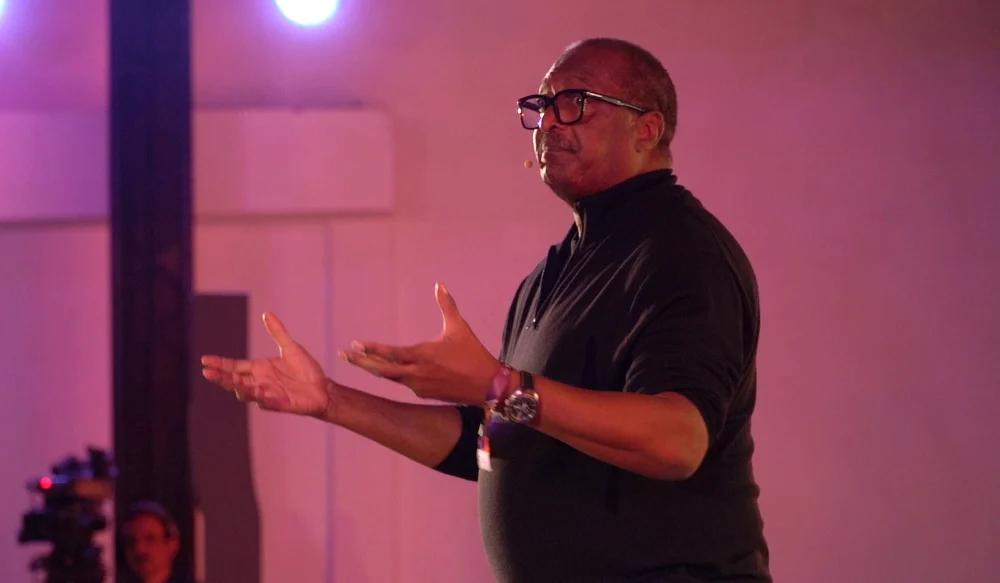RIYADH: From Algerian singer Cheb MamiŌĆÖs feature on StingŌĆÖs ŌĆ£Desert RoseŌĆØ in 1999 to MarshmelloŌĆÖs 2022 collaboration with Lebanese songstress Nancy Ajram, Arab nuances have been slowly weaving their way into the fabric of Western music.
However, Arab women remain on the sidelines of the industry, with only a handful of prominent acts making waves.
In ČČę§Č╠╩ėŲĄ, SpotifyŌĆÖs annual Wrapped campaign revealed that no female musicians from the Kingdom made it onto the countryŌĆÖs top 10 streaming artistsŌĆÖ list, and only three Khaleeji tracks, two of them by Syrian artist Assala Nasri, were most streamed.

Palestinian chilean singer┬ĀElyanna
But with the regional music scene predicted to become the fastest growing in the world, Arab women are aiming to buck the trend through authenticity.
At the recent XP Music Futures conference, industry experts and artists shared their thoughts on projecting women on a global stage.
Palestinian Chilean singer Elyanna has quickly made a name for herself globally, and has captivated audiences with her mane of dark blonde curls and piercing green eyes.
Supported and discovered by Lebanese Canadian musician Massari and The WeekndŌĆÖs manager Wassim ŌĆ£SalŌĆØ Slaiby, she now has more than 400,000 monthly listeners on Spotify.
Her sensual vocals and contemporary lyrics appeal to the masses as she bridges cultures in a way that is authentic yet mainstream and she is quickly becoming the voice of a multicultural generation.

Matthew Knowles
As opposed to many other upcoming artists, Elyanna remains distinctly an Arabic lyricist, incorporating her Palestinian roots into creating a unique genre of her own.
She told Arab News: ŌĆ£When I work on my music, I donŌĆÖt think of it like, ŌĆśoh, letŌĆÖs do something crazy.ŌĆÖ I think of it as me. IŌĆÖm 20 years old, and I just do what feels right to me.
ŌĆ£So of course, the generation is going to get that, because theyŌĆÖre going to connect with how a 20-year-old girl feels.ŌĆØ
The beauty about songs is they donŌĆÖt look at if youŌĆÖre male or female. Songs are songs. It starts with great songs.
Matthew Knowles
While she noted that she was too young to give advice on navigating the challenges that come with being a woman in the industry, she highlighted the word try within all her aspirations.
Elyanna said: ŌĆ£When you care, and youŌĆÖre passionate, thatŌĆÖs all you need. I believe that Arab music is going to have an impact one day. ItŌĆÖs not going to be easy, obviously, nothing comes really easy. I do think our culture is so beautiful, thereŌĆÖs so much that the world did not see about our culture.
ŌĆ£Imagine we show them our dancers, the way they dance; so authentic, so beautiful. And look at the instruments we have, the melodies we have, the beats. You see a lot of Americans; they take them and make them hip hop beats. This says so much. This is such a start,ŌĆØ she added.
Mathew Knowles, the visionary manager behind the careers of DestinyŌĆÖs Child, Beyonce, and Solange, the latter two to whom he is the father, spoke about how to be a successful female act in the global market. He said that while 75 percent of his clients over the years had been women, image was key in the music industry.
ŌĆ£The beauty about songs is they donŌĆÖt look at if youŌĆÖre male or female. Songs are songs. It starts with great songs.
ŌĆ£I wanted to also understand that with the culture, will the youth be able to look contemporary in their dress and can women be contemporary in their dress? Because if youŌĆÖre going to compete against the world, thatŌĆÖs what youŌĆÖre competing against, right?ŌĆØ
He added that language was also something to take into consideration; would an artist be singing solely in Arabic, English, or both?
Knowles said: ŌĆ£How are you going to approach the language barrier if youŌĆÖre going to grow?ŌĆØ
Hailing from the regionŌĆÖs biggest rap scene, Egyptian musician Felukah has been flipping the concept of Arabic hip hop.
Inspired by global prose and poetry from the likes of poet Nayyirah Waheed and Japanese writer Haruki Murakami, her intriguing lyrics find a way to adapt to the nature of rap and hip hop music by mixing Arabic and English lyrics.
Felukah told Arab News: ŌĆ£What IŌĆÖm really trying to do is represent myself in the most authentic way possible. And when people find that relatable, they like the music.ŌĆØ
She recently released Coca ColaŌĆÖs 2022 FIFA World Cup anthem, an all-girl collaboration with Saudi musician Tamtam and Mexican singer Danna Paola, remaking QueenŌĆÖs 1986 hit ŌĆ£A Kind of Magic,ŌĆØ and gave a captivating performance at XP Music Futures in November.
On her experience being a woman in the industry, Felukah said: ŌĆ£I get hate from men, and I get hate from women. A lot of the time I hear, ŌĆśI donŌĆÖt like women rapping, I like male voices.ŌĆÖ
ŌĆ£ThatŌĆÖs not a critique. You need to expand your range. You need to listen; thereŌĆÖs so many women rappers, thereŌĆÖs so many women singers, and the fact that a person is not familiar enough with womenŌĆÖs voices and hasnŌĆÖt found at least one that they like is wild. So, I donŌĆÖt accept that,ŌĆØ she added.
She noted that authentic Arabic music will not rise to the top in one song, but contemporary artists today, including herself, were working toward representation in a brighter future.











